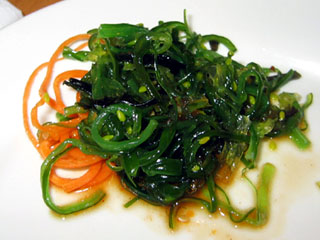Chinese Culture >> Chinese Food Articles >> Eating Seaweed
Eating Seaweed
Have you ever thought of eating seaweed as a
healthy nutritious food? Probably not. Grocery store isles are not exactly
brimming with shelves stocked with seaweed. Quite the contrary, you would be
lucky to find any seaweed product there. So it would be no wonder if this item
were missing from your kitchen cupboard at home, and how many recipes in your
cookbook are there that calls for seaweed as an ingredient. You won't find it in
your average menu plan. It is not something people usually consider when
thinking about food unless they are into sushi, which is often served with
seaweed.
Statistics show that the people of Japan have better health than people living
in the United States. Seaweed is a staple food of the island country of Japan
and diet is often the factor determining good health and longevity. Seaweed has
the high-fiber of vegetables, more protein than meat, and more calcium than
milk. Eating seaweed is not a bad idea at all.
Replacing the fat of fast food burgers with the fiber of seaweed would go a long
way to improving the way we eat. It could be done using seaweed extract without
the burgers tasting much different.
A lot of modern food is over-processed and grown in depleted soil. That is not
so if you eat seaweed. The ocean floor is rich in nutrient material and seaweed
is a concentrated source of minerals. Supplementing your regular diet with
seaweed is a good way to be sure you are getting the quantity and variety of
trace minerals and vitamins you need.
There are many types of seaweed. You can find them in health food stores as well
as stores that sell Asian food. Look for Agar, Dulse, Hijiki, Irish Moss (which
saved thousands of people from starvation during the potato famine of 19th
century Ireland), Kelp, Kombu, Laver, Nori, Sloke, and Wakame. Put them together
and you have a low calorie sea-vegetable salad! Seaweed can also be used in
seasonings, soups, teas, and assorted food recipes.
Seaweed may not be the name we want to call this food with such value. Sea
plants, sea vegetables, marine flora, or ocean herbs may be more appropriate
titles. Many scientific studies have been done on the medicinal properties of
these ocean herbs.
Limu Maui is an exotic name, which translated means brown seaweed. There is a
substance in brown seaweed called fucodian which a Japanese researcher claims to
be similar to mothers' milk in its effect on the human immune system. PubMed is
a service of the National Library of Medicine and the National Institutes of
Health and is a good place to look-up studies on fucodian, laminarin (also an
immune-booster found in brown seaweed), or anything else. It is available at
either pubmed.gov or pubmed.org on the world wide web.
If you have no inclination to eat vegetables let alone sea vegetables, you can
still benefit by getting them in easy to take supplement form as in tablets,
capsules, or liquid extract. In that way you can also get the smaller algae
forms of seaweed like chlorella or spirulina. You would be getting plenty of
beta-carotene, vitamin C, potassium, calcium, magnesium, iron, and iodine.
Again, studies on these can be found at PubMed.
Seaweed is a wholesome food that adds variety to your diet and is good for your
health.

